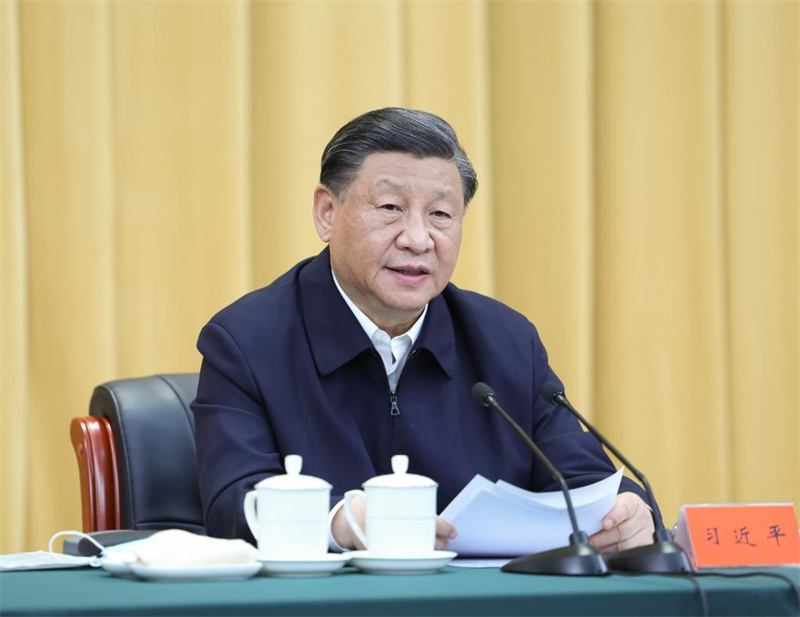
Chinese President Xi Jinping, also general secretary of the Communist Party of China Central Committee and chairman of the Central Military Commission, participates in a meeting on cultural inheritance and development, and delivers an important speech in Beijing, capital of China, June 2, 2023. [Photo/Xinhua]
BEIJING -- Chinese President Xi Jinping has called for shouldering new cultural missions and building a modern Chinese civilization.
Xi, also general secretary of the Communist Party of China (CPC) Central Committee and chairman of the Central Military Commission, made the remarks at a meeting on cultural inheritance and development on Friday.
The cultural missions in the new era are to further advance cultural prosperity, to build a leading country in culture and to foster the modern Chinese civilization, Xi said.
"With unwavering cultural confidence, a profound sense of mission and a spirit of relentless endeavor, we must unite our efforts to create a new culture for our times," he said.
Before the meeting, Xi had visited the China National Archives of Publications and Culture (CNAPC) and the Chinese Academy of History.
Cai Qi, a member of the Standing Committee of the Political Bureau of the CPC Central Committee and a member of the Secretariat of the CPC Central Committee, accompanied Xi on the visits and presided over the meeting.
On Thursday afternoon, Xi visited the headquarters of the CNAPC in the northern suburbs of Beijing. Following a tour of the exhibition halls, Xi expressed his concern for the invaluable classic publications that have endured the vicissitudes of time.
The CNAPC was built to carry forward the Chinese civilization, the only uninterrupted civilization in the world, said Xi.
Xi emphasized the institution's primary responsibility of collection, while also encouraging it to strengthen the research on collected items.
On Friday afternoon, Xi visited the Chinese Academy of History. He walked into the Chinese Archaeological Museum in the academy and toured exhibitions including one on the origins of civilization.
Xi highlighted the integral role of archaeology in deepening the understanding of the rich and profound Chinese culture. He emphasized the significance of conducting research and providing interpretations regarding the origins of Chinese civilization.
Xi conveyed his expectations that scholars would continue to enhance their research endeavors and contribute their wisdom and efforts to the advancement of Chinese modernization.
Subsequently, Xi participated in the meeting on cultural inheritance and development at the academy. After several professors and scholars spoke, he delivered an important speech.
Xi emphasized that the Chinese civilization has a long and continuous history stretching back to antiquity, and said that a comprehensive and profound understanding of that history is essential to promoting the creative transformation and development of fine traditional Chinese culture more effectively, and to developing modern Chinese civilization.
PROMINENT FEATURES OF CHINESE CIVILIZATION
As prominent features of Chinese civilization, its consistency determines on a fundamental level that the Chinese people must follow their own path, and its originality determines the enterprising spirit of the Chinese people, Xi said.
Its unity determines fundamentally that the various ethnic cultures of the Chinese nation are integrated and rally closely together, even when faced with major setbacks, and that a strong and unified country is the pillar upon which the well-being of all Chinese people depends, Xi added.
He went on to say that the inclusivity of the Chinese civilization determines the harmonious coexistence of diverse religious beliefs in China, and determines the open-minded and inclusive mentality toward various civilizations around the world. Its peaceful nature determines that China will continue to pursue exchanges and mutual learning with different civilizations rather than cultural hegemony, that China will not impose its own values and political system on others, and that China will promote cooperation rather than confrontation and will not create exclusive blocs.
CULTURAL CONFIDENCE AT NEW HEIGHTS
Integrating the basic tenets of Marxism with China's specific realities and fine traditional culture is the path that must be taken to explore and develop socialism with Chinese characteristics within the Chinese civilization, which has stretched for more than 5,000 years, Xi noted, adding that this integration is the most important tool for the Party to achieve its success.
Despite their different cultural roots, Marxism and China's fine traditional culture are highly consistent with each other, Xi said.
The integration of Marxism and China's fine traditional culture will create a new type of culture that fits within Chinese modernization, and it will expand the cultural foundation of the path of socialism with Chinese characteristics, he said.
Their integration will provide a broader cultural space for theoretical and institutional innovation for the future, and strengthen the cultural subjectivity of the Chinese people, he said.
Their integration highlights that the Party's understanding of the Chinese path, theory and system has reached a new height, as has its confidence in its history and culture, he said. It also shows that the Party's consciousness of the need to advance cultural innovation while inheriting fine traditional culture has climbed to a new level.
Since the 18th CPC National Congress in 2012, the CPC Central Committee has prioritized cultural advancement in its overall work, and has put forward a series of new ideas, viewpoints and judgments that are fundamental guidance for the work in communication, ideology and culture fields, according to Xi.
To build a modern Chinese civilization at this new historical starting point, China should remain confident in its culture and keep pursuing its own path, and promote the Chinese experience into Chinese theory to realize intellectual independence and self-reliance, Xi said.
He also underscored the need to stay committed to openness and inclusiveness, and adapt foreign cultures into China's local context.
Presiding over the meeting, Cai Qi called for the guiding principles of Xi's important speech to be upheld. He stressed the importance of efforts to deepen the understanding of cultural advancement, better shoulder the new cultural missions, and make solid progress in building a modern Chinese civilization and turning China into a country with a strong socialist culture.
Senior officials including Li Shulei, Tie Ning, Shen Yiqin, Qin Gang and Jiang Xinzhi participated in the activities.



